2000-1300 BCE
From Abraham to Moses
Our story begins. Join us as we explore the formative years of the Jewish People from 2,000 to 1,300 years Before the Common Era. From Abraham to Moses.
Abraham Knew The Story of Noah
2000-1800 BCE
Genesis 8:6-12
At the end of forty days, Noah opened the window of the ark that he had made and sent out the raven; it went to and fro until the waters had dried up from the earth.
Then he sent out the dove to see whether the waters had decreased from the surface of the ground. But the dove could not find a resting place for its foot, and returned to him to the ark, for there was water over all the earth…
He waited another seven days, and again sent out the dove from the ark. The dove came back to him toward evening, and there in its bill was a plucked-off olive leaf! Then Noah knew that the waters had decreased on the earth. He waited still another seven days and sent the dove forth; and it did not return to him any more.
As we explore the story of
Abraham, let us first examine the world in which he lived and consider the
things he might have known, based on archaeological evidence that has been
found.
We start with the epic and
apocalyptic story of the Flood. Abraham was well acquainted with Noah and the
flood. Moreover, many myths around the world tell the tale of an ancient flood.
The Book of Genesis records it in detail:
Genesis 8:6-12
“At the end of forty days, Noah opened the window of the ark that
he had made and sent out the raven; it went to and fro until the waters had
dried up from the earth. Then he sent out the dove to see whether the waters had decreased
from the surface of the ground. But the dove could not find a resting place for
its foot, and returned to him to the ark, for there was water over all the
earth… He waited another seven days, and again sent out the dove from the
ark. The dove came back to him toward evening, and there in its bill was a
plucked-off olive leaf! Then Noah knew that the waters had decreased on the
earth. He waited still another seven days and sent the dove forth; and it did
not return to him anymore.”

The British Museum
Mesopotamian Flood Story
Gilgamesh Epic Tablet XI
“When a seventh day arrived I sent forth a dove and released it. The dove went off, but came back to me; no perch was visible so it circled back to me.
I sent forth a swallow and released it. The swallow went off, but came back to me; no perch was visible so it circled back to me.
I sent forth a raven and released it. The raven went off, and saw the waters slither back. It eats, it scratches, it bobs, but does not circle back to me."
The story of the flood is confirmed by the Mesopotamian
account etched into the Gilgamesh Epic Tablet number 11, which is on display at
the British Museum.
“ When the seventh day arrived I sent forth a dove and
released it. The dove went off, but came
back to me; no perch was visible so it circled back to me. I sent forth a swallow and released it. The swallow went off, but came back to me; no
perch was visible so it circled back to me. I sent forth a raven and released it. The raven went off, and saw the waters
slither back. It eats, it scratches, it
bobs, but does not circle back to me."
Babylonian Flood Tablet from Megiddo, Israel
c. 15th Century BCE
You are now looking at the Babylonian Flood Tablet from Megiddo, circa 15th Century BCE. The tablet was found by a shepherd from Kibbutz Megiddo in a pile of excavated soil and includes a portion of the narrative found on the Gilgamesh Epic Tablet.
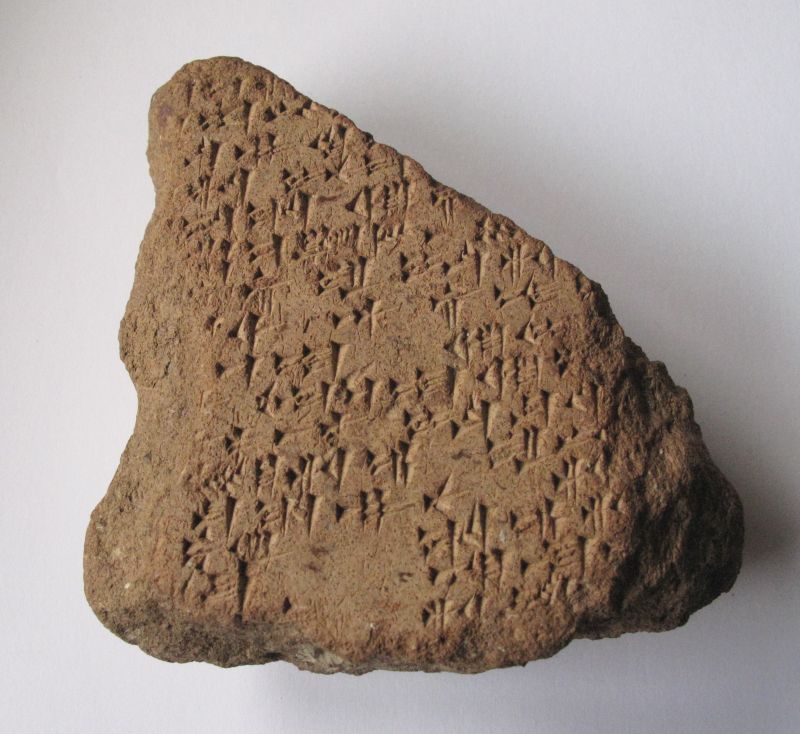
Israel Museum / Israel Antiquities Authority

Noah's Ark by Rembrandt. The Art Institute of Chicago
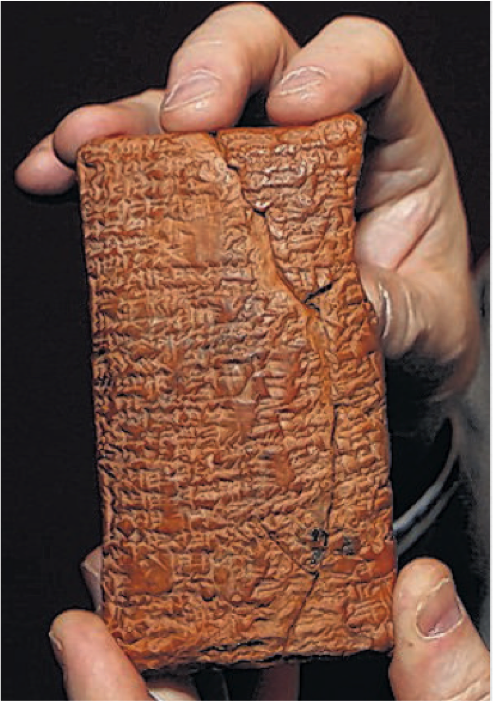
The British Museum
Genesis Flood Story
Genesis 7:15
“They (the animals) came to Noah to enter the ark, two by two of every creature with the breath of life.”
The story continues:
Genesis 7:15
“They [the animals] came to Noah to enter the ark, two by
two of every creature with the breath of life.”
The Ark Tablet, 1700 BCE
This Babylonian Flood Story tablet deciphered in 2014 contains instructions on how to build a circular shaped ark. It instructs to bring the animals “two each, two by two.”
Again the account is cross-referenced, this time by the Babylonian Ark Tablet, dating back 1700 years Before the Common Era. This tablet, deciphered in 2014, contains instructions on how to build a circular-shaped ark. It also contains instructions to bring the animals “two each, two by two.”
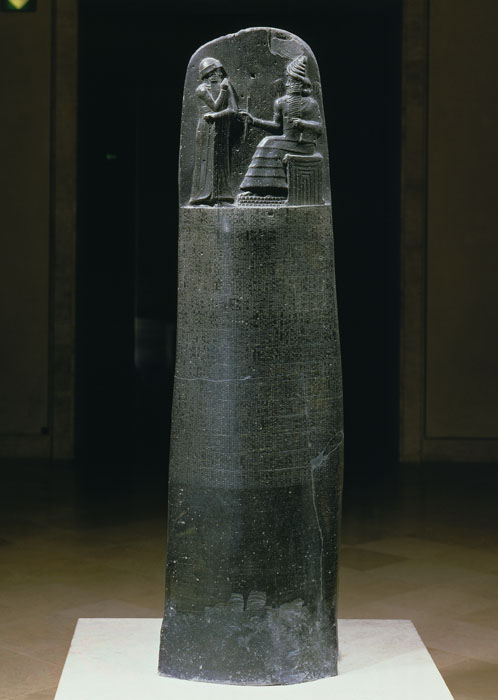
“An Eye for an Eye”
The Code of Hammurabi, 1772 BCE
Law #196
“If a man destroy the eye of another man, they shall destroy his eye. “
Deuteronomy 19:21
Thus you shall not show pity: life for life, eye for eye, tooth for tooth, hand for hand, foot for foot.
Abraham also knew that there was a code of law.
Corresponding to this same time period, The Code of
Hammurabi circa
1772 BCE sites a law, numbered 196 saying:
“If a man destroys the eye of another man, they shall
destroy his eye. “
This corresponds with a verse in Deuteronomy 19:21 of
the Hebrew Bible:
"Thus you shall not show pity: life for life, eye for eye, tooth for tooth,
hand for hand, foot for foot.
The Louvre, Paris
Abraham Might Have Known the Pythagorean Theorem
Tablet for calculating the area of a field, c. 1800 BCE
On this tablet, students are asked to calculate the areas of various fields of land. This tablet predates Pythagoras, who lived in Babylon in 525 BCE.
You are looking at an ancient tablet displayed in the
British Museum.
It includes what is today known as the Pythagorean Theorem for
calculating the area of a field, circa 1800 BCE.
On this tablet, students are asked to calculate the areas of
various fields of land.
Therefore, the Pythagorean Theorem may have been well-known
to Abraham.
This tablet predates Pythagoras, who lived in
Babylon in 525 BCE.
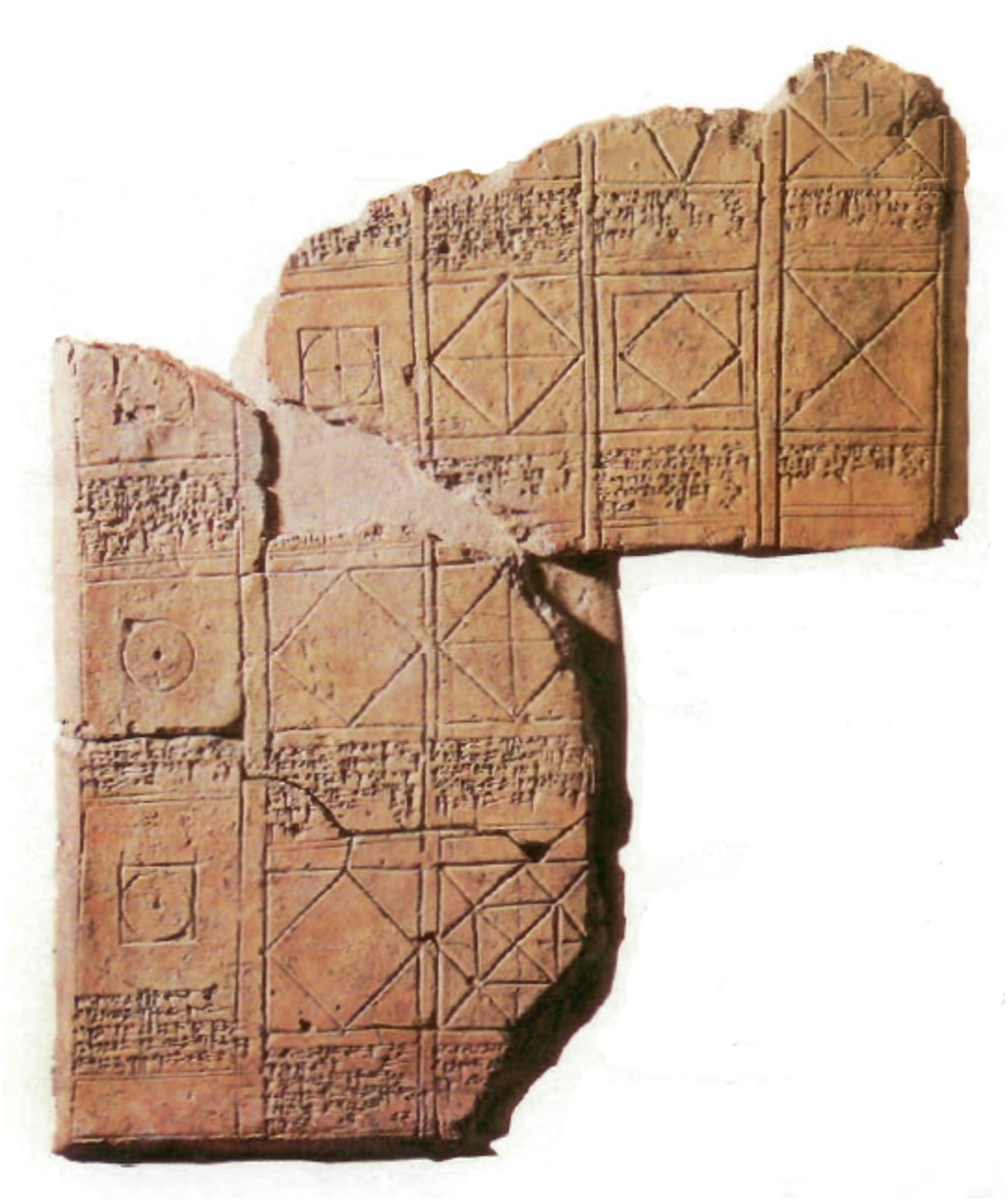
The British Museum
Abraham Enters the Land of Israel
2000-1800 BCE
Genesis 12:1
The L-rd said to Abram, "Go forth from your native land and from your father’s house to the land that I will show you."
Our story now turns to Abraham, the first of the three Patriarchs of the Jewish People, as his journey begins around 2,000 years BCE. Genesis 12:1 The L-rd said to Abram, "Go forth from your native land and from your father’s house to the land that I will show you."

Israel Museum / Israel Antiquities Authority
Institute for the Study of the Ancient World, NYU
Canaan At the Time of Abraham
Masters of Fire: Copper Age Art from Israel has been organized by the Institute for the Study of the Ancient World and the Israel Antiquities Authority in collaboration with the Israel Museum, Jerusalem. View the virtual tour with narration by Co-Curator Daniel M. Master.
Canaan during the time of Abraham:
Explore the “Masters of Fire” exhibition that focuses on the
Copper Age Art, from Israel. The exhibition was curated by the Institute for
the Study of the Ancient World and the Israel Antiquities Authority in
collaboration with the Israel Museum in Jerusalem. Click the button to view the virtual tour
with narration by Co-Curator Daniel M. Master, Professor of Archaeology at
Wheaton College.
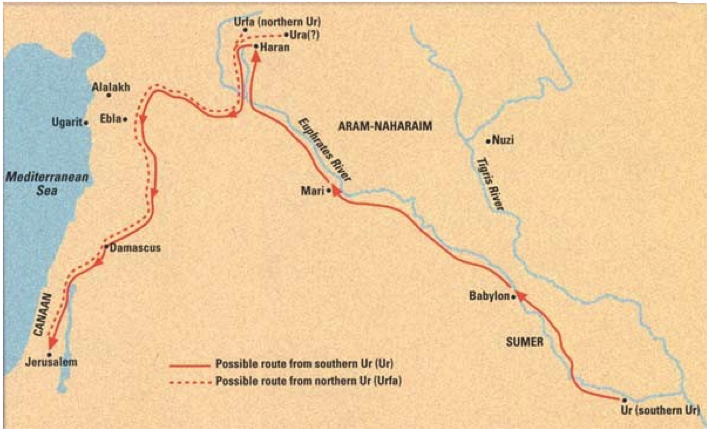
Biblical Archaeology Society
Abraham Journeys to Canaan, 2000-1800 BCE
Genesis 12:5-75
And Abram took his wife Sarai, his nephew Lot, and all the possessions and people that they had acquired in Haran; and set out for the land of Canaan. And they came to the land of Canaan.
Abram traveled through the land as far as the site of the Oak of Moreh at Shechem. And at that time the Canaanites were in the land. Then the L-RD appeared to Abram and said, “I will give this land to your offspring.” So Abram built an altar there to the L-RD, who had appeared to him.
Abram leaves his father’s house and travels from Ur of the
Chaldeans along the fertile crescent of the Euphrates River to Haran.
Genesis 12:5-7
And Abram took his wife Sarai, his nephew Lot, and all
the possessions and souls they had acquired in Haran and set out for the land
of Canaan. And they came to the land of Canaan. Abram travelled through the land as far as the site of
the plain of Moreh at Shechem. And at that time the Canaanites were in the
land. Then the L-RD appeared to Abram and said, “I will give this land to your
offspring.” So Abram built an altar there to the L-RD, who had appeared to him.
Israel Museum / Israel Antiquities Authority
Pottery with Sculpture of a Canaanite Man
This 4,000 year old jug with a sculpture of a Canaanite man sitting atop it was found near Tel Aviv in 2016.
In this picture is a 4,000-year-old jug with a sculpture of a Canaanite man sitting atop it. It was found during salvage excavations in 2016 near Tel Aviv.
The Sojourn of Abram into Egypt
Genesis 12:10
“Now there was a famine in the land (i.e. Canaan); so Abram went down to Egypt to sojourn there, for the famine was severe in the land.”
 This scene was carved into cliffs overlooking the Nile at Beni Hasan, c. 1900 BCE. It depicts S emites (possibly Israelites) in Egypt. Bearing the Egyptian title for Hyksos, a figure named Abisha (leaning over an ibex, second from right), leads his clansmen into Egypt.
This scene was carved into cliffs overlooking the Nile at Beni Hasan, c. 1900 BCE. It depicts S emites (possibly Israelites) in Egypt. Bearing the Egyptian title for Hyksos, a figure named Abisha (leaning over an ibex, second from right), leads his clansmen into Egypt.
A famine forced Abram and Sarai to leave Canaan and sojourn to Egypt. Genesis 12 verse 10 tells the story: Now there was a famine in the land so Abram and Sarai went down to Egypt to sojourn there, for the famine was severe in the land.” In front of you is a scene that was carved into cliffs overlooking the Nile at Beni Hasan, circa 1900 BCE dating to the relevant time period. It depicts Semites (possibly Israelites) in Egypt. Bearing the Egyptian title of Hyksos, a figure named Abisha - leaning over an ibex, second from right - leading his clansmen into Egypt.
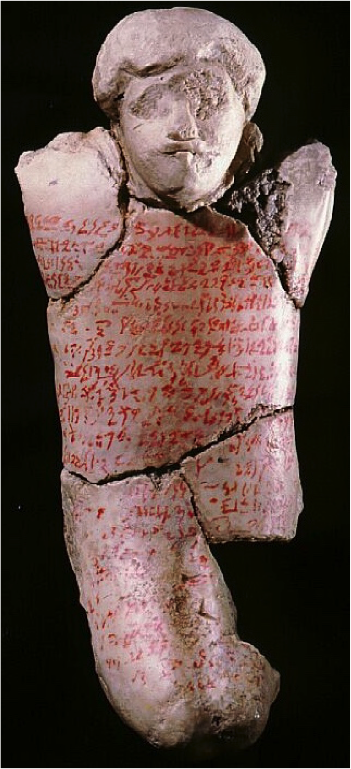
Replica, Musées Royaux d’Art et d’Histoire, Brussels, Belgium
Egyptian Execration Doll Contains the First Mention of Jerusalem, c. 1800 BCE
Abram Meets the King of Jerusalem, Genesis 14:18-19
And King Melchizedek of [Jeru]Salem brought out bread and wine; he was a priest of G-d Most High. He blessed him, saying, “Blessed be Abram of G-d Most High, Creator of heaven and earth.”
Execration Doll Inscription:
“The Ruler of Jerusalem Setj-’Anu, and all the retainers who are with him…”
Here is a picture of an Egyptian Execration or “Curse” Doll
that contains the First Mention of Jerusalem, circa. 1800 BCE
The Inscription mentions a curse on the king of Jerusalem:
“The Ruler of Rushalimum, Setj-’Anu, and all the
retainers who are with him…”
In Genesis, we read the account of Abram meeting the King of
Jerusalem, which at that time was referred to as Salem or in Hebrew “Shalem”.
Genesis 14:18-19
From Abram to Abraham
Genesis 17:1-5
When Abram was ninety-nine years old the L-RD appeared to Abram and said to him, “I am El Shaddai. Walk in my ways and be blameless. I will establish My covenant between Me and you, and I will make you exceedingly numerous.” Abram threw himself on his face; and G-d spoke to him further, “As for me, this is My covenant with you: You shall be the father of a multitude of nations. And you shall no longer be called Abram, but your name shall be Abraham, for I make you the father of a multitude of nations."
Our story now continues through the masterful Biblical
renditions of one of the greatest visual artists in history, Rembrandt van
Rijn.
G-d changes Abram’s name to Abraham.
Genesis 17:1-5
When Abram was ninety-nine years old the L-RD
appeared to Abram and said to him, “I am El Shaddai. Walk in my ways and be blameless. I will establish My covenant between Me and
you, and I will make you exceedingly numerous. ” Abram threw himself on his face; and G-d
spoke to him further, “As for me, this is My covenant with you: You shall be
the father of a multitude of nations. And you shall no longer be called Abram,
but your name shall be Abraham, for I make you the father of a multitude of
nations.
G-d Making His Covenant with Abraham by Rembrandt
The Frick Collection, New York
Abraham Serving Three Angels
by Rembrandt
Genesis 18:1-2, 10
The L-RD appeared to him (Abraham)… Looking up, he saw three figures standing near him.…. Then one said, “I will return to you next year, and your wife Sarah shall have a son!”
Abraham and Sarah guided many into the monotheistic faith of
One G-d. They did not have children of their own until the Bible describes the
visitation of three angels, bringing them surprising news.
Genesis 18:1-2, 10 The L-RD appeared to him (Abraham) by the
terebinths of Mamre… Looking up, he saw three men standing near him.…. Then one
said, “I will return to you next year, and your wife Sarah shall have a son!”
Sotheby's Auction House, 2020
Abraham and Isaac
by Rembrandt
Genesis 22:6
Abraham took the wood for the burnt offering and put it on his son Isaac. He himself took the firestone and the knife; and the two walked off together.
One of the most challenging stories in the Bible, known as
the Akeida, the binding of Isaac, is that of G-d testing Abraham, telling him to
offer his beloved son. Abraham did not hesitate and rose early the next
morning.
Genesis 22:6
Abraham took the wood for the burnt offering and
put it on his son Isaac. He himself took the firestone and the knife; and the
two walked off together.

Collection of George Blumenthal

Hermitage Museum, St. Petersburg
An Angel Prevents the Sacrifice of Isaac
by Rembrandt
Genesis 22:10-12
And Abraham picked up the knife to slay his son. Then a messenger of the Lord called him from heaven … "Do not raise your hand against the boy."
The Bible states that an angel intervened a moment before Abraham
would complete the offering.
Genesis 22:10-12 And Abraham picked up the knife to slay his son.
Then an angel of the L-RD called him from heaven … "Do not raise your hand
against the boy."
Abraham Purchases the Cave of Machpelah
Genesis 23:19
And then Abraham buried his wife Sarah in the cave of the field of Machpelah east of Mamre --now Hebron--in the land of Canaan.
Herod the Great (37-4 BCE) built a mighty enclosure upon the cave. The building was reconstructed as a mosque in the Arab period in
637 CE.
During these events, Sarah, Abraham’s beloved wife had
passed. Abraham legally and contractually purchased the estate in which Sarah
was to be buried.
Genesis 23:19
And then Abraham buried his wife Sarah in the cave of the
field of Machpelah east of Mamre --now Hebron--in the land of Canaan.
Machpelah comes from the root word ‘Kefel” which means to
multiply or double, referring to the three couples buried there. The site would
ultimately become the burial place for the three patriarchs and three of the
four matriarchs of the nation of Israel. Tradition also places it as the burial
place of Adam and Eve.
Herod the Great who reigned from 37-4 BCE built a mighty
enclosure upon the cave. The building was later reconstructed as a mosque in
the Arab period of 637 CE.
Photo by AnaRina Kreisman

The British Museum, London
Esau Selling his Birthright to Jacob
by Rembrandt
Genesis 25:33
But Jacob said, "Swear to me first." So he (Esau) swore to him, and sold his birthright to Jacob.
Isaac and Rebecca had twins. Esau born first sold his birthright
to Jacob his younger brother.
Genesis 25:33
But Jacob said, "Swear to me first." So,
he (Esau) swore to him and sold his birthright to Jacob.
Jacob's Ladder
by Rembrandt
Genesis 28:12
He (Jacob) had a dream; a stairway was set on the ground and its top reached to the sky, and messengers of G-d were going up and down on it.
After Jacob received the blessing of the firstborn from his
father Isaac, he had to flee from the wrath of his brother Esau to Haran.
On his way, he encountered a special place and decided to
sleep there for the night.
That night he had a dream of a ladder where angels were ascending
and descending between heaven and earth.
The Torah relates the story in Genesis 28:12
He had a dream; a ladder was set on the earth and its top
reached heaven, and angels of G-d were ascending and descending on it.
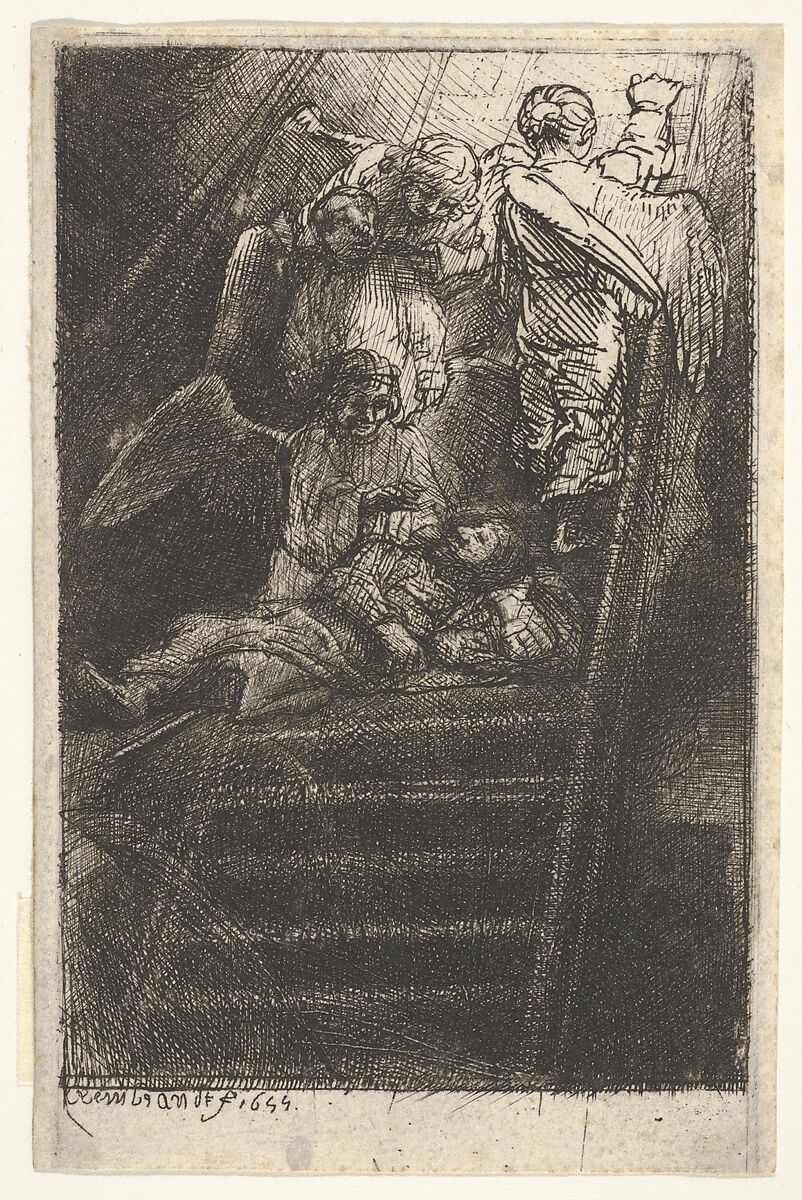
Metropolitan Museum, New York
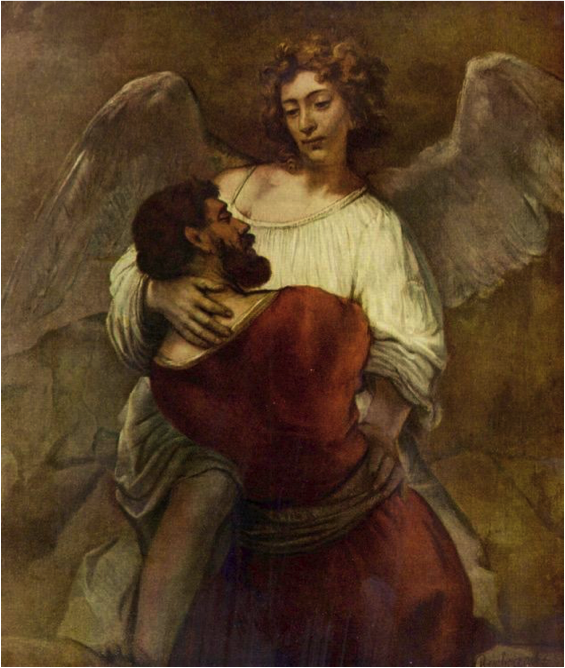
Jacob Wrestling with the Angel by Rembrandt
Gemäldegalerie, Berlin
Jacob Becomes “Israel”
Genesis 32:25, 29
Jacob was left alone. And a figure (angel) wrestled with him until the break of dawn.
…
Said he (the angel), "Your name shall no longer be Jacob, but Israel, for you have striven with beings divine and human and have prevailed.”
After
20 years working for
his uncle Laban in Haran, Jacob took his two wives, Leah and Rachel, their
handmaidens, and his sons and left for his father’s house. During his journey
one night, he breaks up camp and crosses his family over the Jabbok river.
Remaining
behind and alone, he encounters an angel that wrestles him till dawn. The angel
then gives him a new name, Israel. The Hebrew root of this word both means to
strive or to exert superior power or authority (שרה), or to straighten (ישר). Overcoming this divine
test from G-d, Jacob merits a new name, inherently also indicating a new
status. In combination with the word El which means divine power, the name
Israel means to strive and attain authoritative influence with the divine as
well as to walk upright with G-d.
Genesis 32:25 and 29
Jacob was left alone. And a man wrestled with him until
the break of dawn. … He (the angel) said: "Your name shall no longer be
Jacob, but Israel, for you have striven with divine powers and men and have
prevailed.”
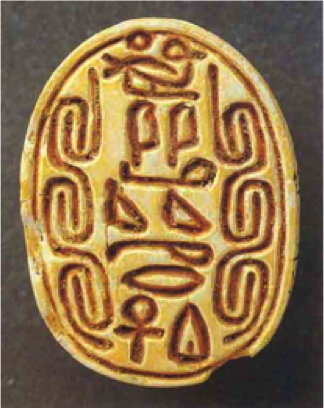
Israel Antiquities Authority
Jacob Scarab Seal
1730 BCE
Found near Haifa, Israel, and dating to the 18th century BCE, this scarab—probably used to seal papyrus scrolls or as a piece of jewelry—is thought to have belonged to a Canaanite king named Jacob. The hieroglyphs in the scarab spell out Y’qb-HR, the Egyptian transliteration of the Semitic Yaqub (Jacob).
In this picture is the Jacob Scarab Seal, Circa 1730 BCE.
Found near Haifa, Israel, and dating back to the 18th
century BCE, this scarab that was probably used to seal papyrus scrolls or as a
piece of jewellery—is thought to have belonged to a Canaanite king named
Jacob.
The hieroglyphs in the scarab
spell out Y’qb-HR, the Egyptian transliteration of the Semitic Yaqub (Jacob) or
Yaakov in Hebrew.
Abraham, Isaac, and Jacob were considered kings and
their sons’ princes by all the inhabitants of the land.
The Sons of Jacob
Genesis 35:22-26
Jacob had twelve sons:
The sons of Leah:
Reuben the firstborn of Jacob,
Simeon, Levi, Judah, Issachar and Zebulun.
The sons of Rachel:
Joseph and Benjamin.
The sons of Rachel’s servant Bilhah:
Dan and Naphtali.
The sons of Leah’s servant Zilpah:
Gad and Asher.
Jacob had twelve sons who would later become the Twelve
Tribes of Israel.
Genesis 35:22-26
Jacob had twelve sons:
The sons of Leah:
Reuben the firstborn of Jacob, Simeon, Levi, Judah, Issachar and Zebulun.
The sons of Rachel:
Joseph and Benjamin.
The sons of Rachel’s servant Bilhah:
Dan and Naphtali.
The sons of Leah’s servant Zilpah:
Gad and Asher.

Collection of George Blumenthal
Joseph Telling His Dreams to His Brothers
by Rembrandt
Genesis 37:5-7
Once Joseph had a dream which he told to his brothers; and they hated him even more. He said to them, "Hear this dream which I have dreamed: There we were binding sheaves in the field, and suddenly my sheaf stood up and remained upright; then your sheaves gathered around and bowed low to my sheaf."
Joseph, Jacob’s beloved son from Rachel, had divine dreams
indicating his future reign in Egypt. Sharing these dreams, however, stirred
animosity between his brothers.
Genesis 37:5-7
Once Joseph had a dream which he told his brothers;
and they hated him even more. He said to them, "Hear this dream which I have
dreamed: There we were binding sheaves in the field, and suddenly my sheaf
stood up and remained upright; then your sheaves gathered around and bowed low
to my sheaf."
Joseph Is Sold by His Brothers
by Rembrandt
Genesis 37:28
When Midianite traders passed by, they (his brothers) pulled Joseph out of the pit. They sold Joseph for twenty pieces of silver to the Ishmaelites, who brought Joseph to Egypt.
The brothers devised a plan to get rid of Joseph. They
ultimately sold him as a slave.
Genesis 37:28
When Midianite traders passed by, they pulled
Joseph out of the pit. They sold Joseph for twenty pieces of silver to the
Ishmaelites, who brought Joseph to Egypt.
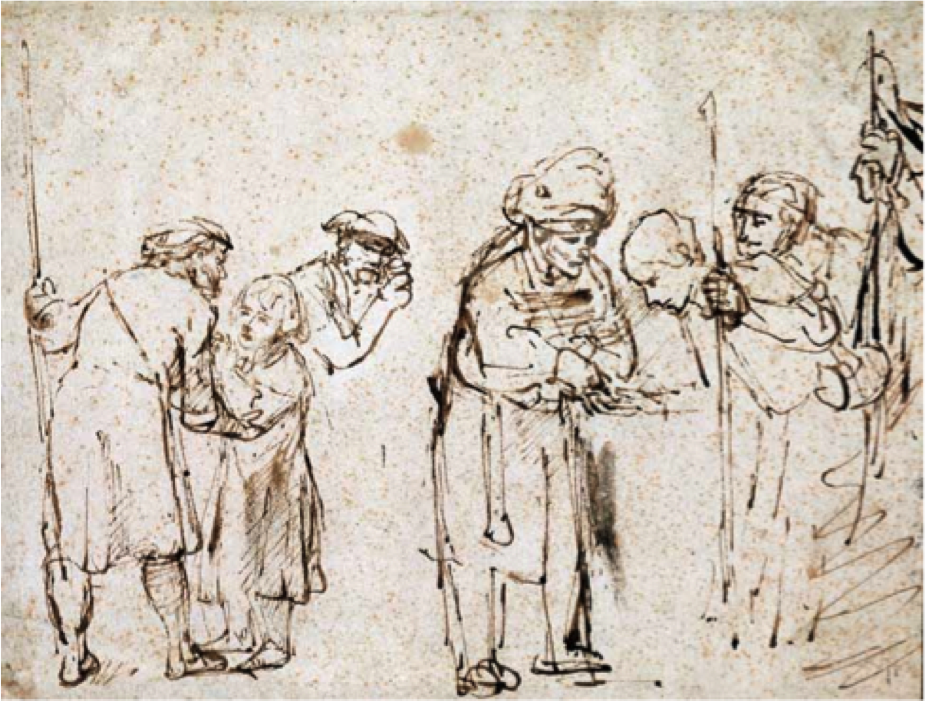
Staatlichen Museen, Berlin

Metropolitan Museum of Art, New York
Joseph's Coat Brought
to Jacob
by Rembrandt
Genesis 37:32-33
They sent the coat of many colors to their father and said, "We found this. Examine it to see whether it is your son’s coat or not."
His father recognized it and said, "It is my son’s coat! A vicious animal has devoured him. Joseph has surely been torn to pieces!"
The brothers took Joseph’s coat that Jacob gave him, tore it,
and dipped it in blood to make it look like he was devoured by a wild animal.
Genesis 37:32-33
They sent the coat of many colors to their father and
said, "We found this. Examine it to see whether it is your son’s coat or
not."His father recognized it and said, "It is my
son’s coat! A vicious animal has devoured him. Joseph has surely been torn to
pieces!"
Joseph Accused by Potiphar's Wife by Rembrandt
Genesis 37:36, 39:19-20
“The Midianites, meanwhile, sold him in Egypt to Potiphar, a courtier of Pharaoh and his prefect. ...
When his master (Potiphar) heard the story his wife told him, saying, "This is how your slave treated me," he burned with anger. Joseph's master took him and put him in prison, the place where the king's prisoners were confined…
Joseph was sold as a slave in Egypt to the house of Potiphar. There he was respected by his master, but Potiphar’s wife wanted to force Joseph to lie with her. Constantly refusing
her advances, she then falsely accused him of attempting to lie with her.
Potiphar took
Joseph and put him in prison.
Genesis 39:19-20 When
his master heard the story his wife told him, saying, "This is how your
slave treated me," he burned with anger.
Joseph's master took him and put him in prison, the place where the
king's prisoners were confined…
Gemäldegalerie der Staatlichen Museen, Berlin

Getty Museum, Los Angeles
Joseph in Prison Interpreting the Dreams of Pharaoh's Baker and Butler
by Rembrandt
Genesis 41:11-14
"One night both the chief baker and I had dreams, and each dream had its own meaning. Now a young Hebrew (Joseph) was there with us. We told him our dreams and he interpreted them for us. And it happened to us just as he had interpreted…”
So Pharaoh sent for Joseph, who was quickly brought out of the dungeon.
In prison, Joseph encountered two of Pharoah’s ministers,
the head butler and chief baker, who were imprisoned for wrongdoing.
He interpreted their dreams with great accuracy.
Genesis 41:11-14
"One night both the chief baker and I had dreams,
and each dream had its own meaning. Now a young Hebrew was there with us. We
told him our dreams and he interpreted them for us. And it happened to us just
as he had interpreted…”
So, Pharaoh sent for Joseph, who was quickly
brought out of the dungeon.
Joseph Before Pharaoh
by Rembrandt
Genesis 41:15-16
And Pharaoh said to Joseph, I have had a dream, but no one can interpret it. Now I have heard it said of you that for you to hear a dream is to tell its meaning." Joseph answered Pharaoh, saying, "Not I! G-d will see to Pharaoh’s welfare.”
Pharaoh had disturbing dreams which none of his advisers or
magicians could interpret. Two years later, the Butler who was released from
prison, remembered Joseph and he was brought before Pharoah.
Genesis 41:15-16
And Pharaoh said to Joseph, I have had a dream, but
no one can interpret it. Now I have heard it said of you that for you to hear a
dream is to tell its meaning." Joseph answered Pharaoh, saying, "Not
I! G-d will answer to Pharaoh’s welfare.

National Museum and Galleries of Capodimonte, Napoli
Joseph Interprets Pharaoh's Dream
Genesis 41:26-27
“The seven healthy cows are seven years, and the seven healthy ears are seven years; it is the same dream.
The seven lean and ugly cows that followed are seven years, as are also the seven empty ears scorched by the east wind; they are seven years of famine.”
Painting from the tomb of
Nefertari,Thebes, Egypt
The Bible accounts Joseph's interpretation of Pharaoh's
dreams:
Genesis 41:26-27
“The seven healthy cows are seven years, and the seven
healthy ears are seven years; it is the same dream. The seven lean and ugly cows that followed are
seven years, as are also the seven empty ears scorched by the east wind; they
are seven years of famine.”
Egyptian Model Granary from the Tomb of Meketre
Metropolitan Museum of Art
Joseph Predicts the Famine
Genesis 41:49
Thus Joseph stored up grain in great abundance like the sand of the sea, until he stopped measuring it, for it was beyond measure.
Not only did Joseph interpret the dream, but he also
expertly advised Pharoah on how to prepare for the coming famine.
Genesis 41:49
Thus, Joseph stored up grain in great abundance like the
sand of the sea, until he stopped measuring it, for it was beyond measure.
In front of you is a picture of an Egyptian Model
Granary from the Tomb of Meketre.
Famine in Egypt
Genesis 41:56-57
Accordingly, when the famine became severe in the land of Egypt, Joseph laid open all that was within, and rationed out grain to the Egyptians. The famine, however, spread over the whole world.
So all the world came to Joseph in Egypt to procure rations, for the famine had become severe throughout the world.
The famine in Egypt
In this picture is a section of the Prophecy of Nefertiti,
circa 1550 BCE, as found in the 18th Dynasty hieratic manuscript, the Papyrus
St. Petersburg 1116B
“The rivers of Egypt are empty so that the water is
crossed on foot… The land is diminished, but its administrators are many; bare,
but its taxes are great; little in grain, but the measure is large”.
The Bible relates the story of the famine in Genesis
41:56-57 Accordingly, when the famine became severe in the land of
Egypt, Joseph laid open all that was within, and rationed out grain to the
Egyptians. The famine, however, spread over the whole world.So all the world came to Joseph in Egypt to procure
rations, for the famine had become severe throughout the world.

Prophecy of Neferti, c. 1550 BCE
Papyrus Hermitage 1116B
“The rivers of Egypt are empty, so that the water is crossed on foot… The land is diminished, but its administrators are many; bare, but its taxes are great; little in grain, but the measure is large”
Jacob Allows Benjamin to Leave for Egypt by Rembrandt
Genesis 43:13-14
“Take your brother too; and go back at once to the man.
And may El Shaddai dispose the man to mercy toward you, that he may release to you your other brother, as well as Benjamin. As for me, if I am to be bereaved, I shall be bereaved.”
Jacob sent his sons to buy food in Egypt, but Benjamin, Joseph’s brother remained with his father. Joseph, who was not recognized by his brothers, insisted that Benjamin returns with them the next time they came to purchase food. With a heavy heart, Jacob sent Benjamin with his brothers as they returned to Egypt.
Genesis 43:13-14
“Take your brother too; and go back at once to the man.
And may El Shaddai give you mercy before the man, that he may release to you your other brother, as well as Benjamin. As for me, if I am to be bereaved, I shall be bereaved.”
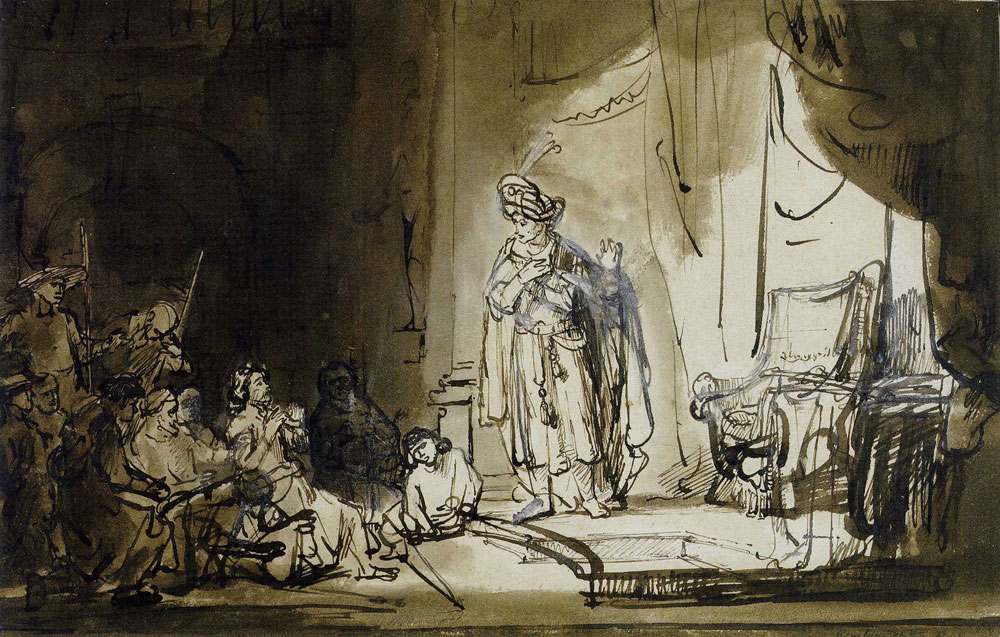
The Louvre, Paris
Joseph Revealing Himself to His Brethren
by Rembrandt
Genesis 45:4
Then Joseph said to his brothers, "Come forward to me." And when they came forward, he said, "I am your brother Joseph, he whom you sold into Egypt.”
In a very emotional exchange, Joseph finally revealed
himself to his brothers, recounting his story.
Genesis 45:4
Then Joseph said to his brothers, "Come
forward to me." And when they came forward, he said, "I am your
brother Joseph, he whom you sold into Egypt.”
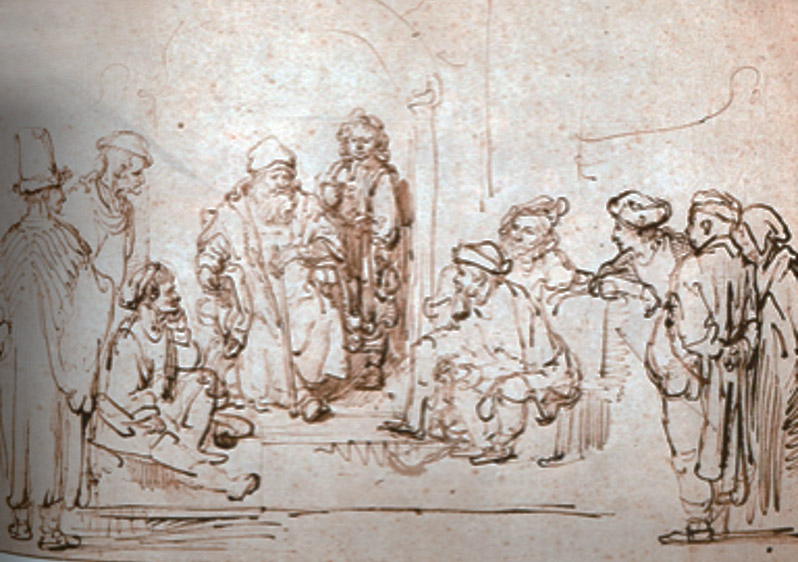
Rembrandt
Jacob Hears that Joseph is Alive
Genesis 45:25-28
They went up from Egypt and came to their father Jacob in the land of Canaan. And they told him, “Joseph is still alive; yes, he is ruler over the whole land of Egypt.” His heart went numb, for he did not believe them.
But when they recounted all that Joseph had said to them, and when he saw the wagons that Joseph had sent to transport him, the spirit of their father Jacob revived. "Enough!" said Israel. "My son Joseph is still alive! I must go and see him before I die."
The brothers speedily brought home the news to their father
Jacob, reviving his spirit.
Genesis 45:25-28
They went up from Egypt and came to their father Jacob in
the land of Canaan. And they told him,
“Joseph is still alive; yes, he is ruler over the whole land of Egypt.” His
heart went numb, for he did not believe them. But when they recounted all that Joseph had said to
them, and when he saw the wagons that Joseph had sent to transport him, the
spirit of their father Jacob revived.
"Enough!" said Israel. "My
son Joseph is still alive! I must go and see him before I die."
Jacob Blessing the Children of Joseph
by Rembrandt
Genesis 48:20
So that day Jacob blessed them and said:
“By you shall Israel pronounce this blessing: ‘May G-d make you like Ephraim and Manasseh.’”
Jacob lived joyfully and in peace for another 17 years in
the land of Egypt. Before he passed, he gathered his sons and blessed them. He
also blessed Joseph’s sons as his own.
Genesis 48:20
So that day Jacob blessed them and said:“By you, shall Israel pronounce this blessing: ‘May G-d
make you like Ephraim and Manasseh.’”
Gemäldegalerie Alte Meister Kassel, Germany
Thutmose I of Egypt,
1506-1493 BCE
Thutmose I led the conquest of Canaan, and went as far north as the border between the Hittite Empire (Turkey) and Syria.
Thutmose I and His Mother Seniseneb,
Metropolitan Museum of Art, New York
Egypt dominated Canaan between 1500-1150 BCE. Thutmose I (the first) led the conquest of Canaan and went as far north as the border between the Hittite Empire (Turkey) and Syria. Thutmose I and His Mother Senseneb are depicted in this image from the Metropolitan Museum of Art in New York.
Pharaoh in Canaan:
The Untold Story
1500-1150 BCE
Egypt dominated Canaan between 1500-1150 BC. This virtual exhibition presents archaeological remains that show the relationship between Canaan and Egypt.
Pharaoh in Canaan:
The Untold Story
1500-1150 BCE
This virtual exhibition presents archaeological
remains that show the relationship between Canaan and Egypt.
Click the button
to view the Virtual tour by Ardon Bar-Hama and the Israel Antiquities Authority
in the Israel Museum
Virtual tour by Ardon Bar-Hama
Israel Museum / Israel Antiquities Authority
Wikimedia Commons
Thutmose III of Egypt
1479-1425 BCE
Relief in the Temple of Karnak in Egypt showing Egyptian Pharaoh Thutmose III (r. 1479 – 1425 BCE) slaying Canaanite captives from the Battle of Megiddo (i.e. Armageddon).
In this picture is a relief in the Temple of Karnak in Egypt showing Egyptian Pharaoh Thutmose III who reigned from 1479 – 1425 BCE, slaying Canaanite captives from the Battle of Megiddo.
Twelve Tribes of Israel
Exodus 1:1-7
These are the names of the sons of Israel who went to Egypt with Jacob, each with his family:
Reuben, Simeon, Levi, and Judah; Issachar, Zebulun, and Benjamin;
Dan and Naphtali; Gad and Asher.
The descendants of Jacob numbered seventy in all, including Joseph, who was already in Egypt.
Now Joseph and all his brothers and all that generation died, but the Israelites were fruitful and increased rapidly; they multiplied and became exceedingly numerous, so that the land was filled with them.
Jacob’s sons flourished in Egypt. Their families grew into
the respective Twelve Tribes of Israel.
Exodus 1:1-7
These are the names of the sons of Israel who went to
Egypt with Jacob, each with his family:
Reuben, Simeon, Levi, and Judah; Issachar, Zebulun, and
Benjamin;
Dan and Naphtali; Gad and Asher.
The descendants of Jacob numbered seventy in all,
including Joseph, who was already in Egypt.
Now Joseph and all his brothers and all that
generation died, but the Israelites were fruitful and increased rapidly; they
multiplied and became exceedingly numerous so that the land was filled with
them.
The Tabernacle at Shiloh, Heritage Division of the Office of the Prime Minister of Israel
This site was created with the Nicepage